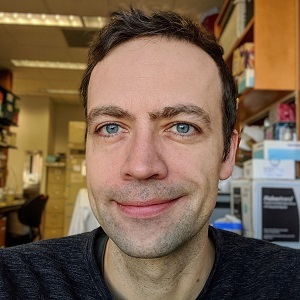Markus Riessland

Assistant Professor, Empire Innovation Program (Aging Brain)
PhD, University of Cologne, Germany
Markus.Riessland@stonybrook.edu
CMM Room 536
Phone (631) 632-4801
Training
Markus Riessland is a trained molecular biologist with a background in neuroscience, human genetics and neurodegenerative diseases. Early in his career, Dr. Riessland was involved in several internationally funded projects, where he performed and published studies on epigenetic modifiers as a potential therapy for the neurodegenerative disease spinal muscular atrophy (SMA). His research is particularly focused on the identification and characterization of neuron-specific disease-modifying factors that may facilitate the development of novel therapeutic strategies for degenerative disorders of the central nervous system.
Research Interests/Expertise
Dr. Riessland focuses on the understanding of cellular senescence. Cellular senescence is a common biological process in which mitotic cells may shut down cell cycle when they recognize they have suffered DNA damage during division This process causes the generation of “undead cells” (a.k.a. Zombie Cells). This helps to prevent damaged cells from growing uncontrollably and causing problems like cancer. Undead cells are, in fact, pretty common and they are found all over the body.
However, senescence is not typically seen in the nerve cells of the brain. Unlike most other cells in the body, neurons stop dividing once they’re fully formed. Dr. Riessland discovered that, surprisingly, post-mitotic dopaminergic neurons —which regulate motivation, memory, and movement by producing chemical messenger dopamine—can nevertheless become senescent. This finding could have widespread implications for the understanding of many age-related neurodegenerative disorders (e.g. Parkinson’s disease) and the aging process itself.
Currently, his lab uses stem cell-based approaches as well as mouse models and next generation sequencing techniques (TRAP-seq, RNA-seq, ATAC-seq, scRNA-seq etc.) to tackle the questions where and how cellular senescence in the brain can occur and spread, which cell types are involved and what the molecular triggers are. Additionally, research in the lab focuses on the identification and molecular characterization of genetic modifiers that influence the vulnerability of neuronal subtypes. The knowledge of molecular modifiers helps to understand the underlying reasons of vulnerability which could be leveraged to protect cells from neurodegeneration. Moreover, the lab’s research aims to interfere with the aging process by ameliorating the unwanted negative effects of cellular senescence. Dr. Riessland received his PhD from the Clinic of the University Cologne, Institute for Human Genetics, Germany.
